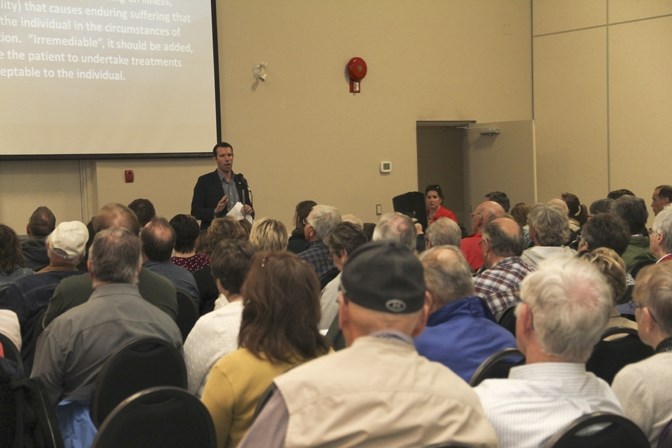There was little consensus among the hundreds who turned out at a meeting on doctor-assisted suicide hosted by the Foothills MP.
There was little consensus among the hundreds who turned out at a meeting on doctor-assisted suicide hosted by the Foothills MP.
MP John Barlow said it reflects the debate at the national level and shows how important it is to develop safeguards to ensure the system is not abused, and doctor-assisted dying is handled in a safe manner for all involved.
“I think this is going to be one of the most important issues we deal with as a parliament,” said he said. “You could see, just from the comments that were in there, that this is a really tough issue, and people are really torn one way or the other.”
More than 200 residents from Okotoks, High River and surrounding areas attended the session hosted by Barlow at the Centennial Centre in Okotoks on April 6.
He said he was impressed with the feedback and size of the crowd, which included concerned citizens as well as physicians and nurses.
The Okotoks event is one of four hosted by Barlow across the riding. He said they have helped him to gauge resident's opinion to voice their concerns in parliament and vote according to their wishes.
Of the 21 recommendations from the special joint committee studying the issue of physician-assisted death, three have raised alarm bells among residents – including mature minors and the mentally ill in the legislation, and not giving doctors a choice of conscience.
“You look at what the Supreme Court has asked us to do, the recommendations go much further than what we expected,” said Barlow. “So we really want Canadians to know these are some of the recommendations that could be part of this legislation, and we need their feedback and we need them to say it's fine or it's going too far.”
Polls reveal 80 per cent of Canadians support physician-assisted death, but Barlow said many of those polled may not fully understand the implications.
“I think for the most part they're thinking the last few months of a terminal cancer patient or someone with ALS,” he said. “They're not thinking of a mature minor. They're not thinking of someone with a mental health issue.”
Okotoks resident Peter Kwong said he is concerned about the potential to include mental illness under the legislation concerned. He said he thinks the Supreme Court's unanimous decision to legalize doctor-assisted dying left the issue far too open-ended.
“I think it's a big concern, with mental illness and mature minors,” said Kwong. “I think people who suffer from mental illness may naturally be depressed and might see no hope and take this route, if there's no safeguard.”
He said the legislation must be written carefully, to protect healthcare providers and citizens alike. The fact all practitioners would be forced to provide referrals to patients for doctor-assisted death even if it goes against their own belief system is wrong, he said.
“I don't believe it's the right thing to do and there should be a lot more safeguards than the recommendations that have been put forward,” said Kwong. “I think it's going down a slippery slope.”
Okotoks resident Diny Woyiwada said she welcomes the legalization of physician-assisted death, but she believes the process needs to be strictly legislated.
“I've seen a couple of close relatives go through really long, traumatic deaths that lasted longer than they should have, so this is really a personal topic for me,” said Woyiwada. “I think it has to be a well-thought out decision and that all possible healthcare should be accessed and used where possible first, if it's not a terminal illness.”
One doctor said it's rare but he has had patients ask him whether he could help end their lives.
Dr. Neil Graham, a retired physician currently working with the High River Cancer Care Clinic, said he knew he was “the odd person out” among the group, but spoke out in favour of the Supreme Court decision.
There will be more people considering the option as a possibility once it's available, he said.
“They'll want to discuss it, to discuss it with their families and think about it and decide whether they want to keep on going, because often they're in very miserable circumstances,” said Graham. “It becomes a difficult life sometimes.”
Melanie Chute, a registered psychiatric nurse at the Foothills Country Hospice, disagreed.
“I'm not in favour of it at all,” said Chute. “I think we're making incredible strides in palliative care.”
Under the care of a single physician or at a hospital, she said, things aren't managed as well as they could be with the multi-faceted approach taken by a hospice team, which includes balancing medication and providing psychological and spiritual care to suit each patient.
“We have seen people come in and say, “Can't you just end it all for me?' But that's just when they first come in,” said Chute. “Then they relax and they let us love them, and that's all part of the medicine.
“So I'm definitely against this. And people who are looking at this as an option, I don't think they know what's available for them to die in a natural way, and the support.”
